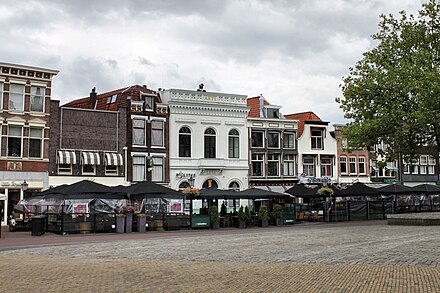Gouda - city and municipality in the province of South Holland, Netherlands
Gouda is a city in the province South-Holland in The Netherlands. It is a typical Dutch city with many old buildings, canals and pretty sights, and is a popular destination for a day trip. It is also a good base for exploring the rest of the Netherlands, thanks to its great rail- and highway connections. The city is famous for its cheese, its 15th-century town hall and the amazing glass windows in St. Janskerk, but there is a lot more to see and do.
Understand
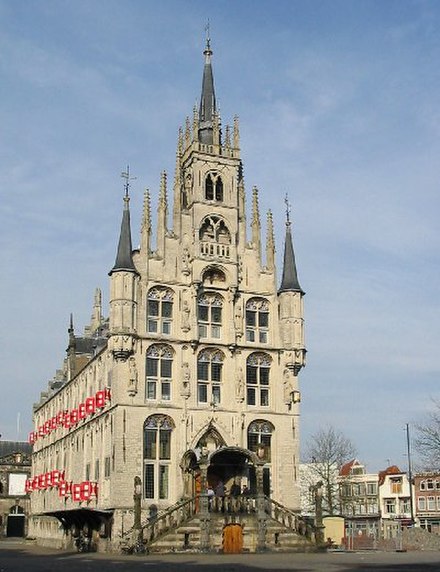

 Gouda has a population of about 71,000. As well as its cheese, Gouda is also famous for its stroopwafels (syrup waffles), candles and its clay pipes. Most of the city is below sea level. The lowest point of the Netherlands can be found a few kilometres outside the city and is marked by a monument.
Gouda has a population of about 71,000. As well as its cheese, Gouda is also famous for its stroopwafels (syrup waffles), candles and its clay pipes. Most of the city is below sea level. The lowest point of the Netherlands can be found a few kilometres outside the city and is marked by a monument.
Gouda is pronounced GHOW-da , with the 'g' pronounced similarly to the 'ch' in 'loch' but voiced in the throat instead of mouth, not with a hard 'g' like how native English speakers pronounce the name of the cheese. The "ou" sound should rhyme with c__ow__ or the German h__au__s. Saying the name correctly will win you points with the locals!
- VVV Gouda (Tourist information), Markt 35 (at the Goudse Waag at the central square), 52.012288°, 4.710884°, +31 182 - 589110, info@welcometogouda.com. Apr-Oct: daily 10:00-17:00; Nov-Mar: Tu-Su 10:00-14:00. 2016-06-12
History
Gouda is named after the river Gouwe and the Van der Goude family, who built a castle on the Gouwe River in the 11th century. At that time, the area was swampland. Over the next two hundred years peat was collected and the land was developed. In 1225, a canal was built connecting the Gouwe River with the Oude Rijn (part of the Rhine delta). This was used to help ship goods to France and further afield. This provided a safer route than traveling by sea. This resulted in a surge of economic activity around Gouda and the town gained importance. In 1272, it was declared a city by count Floris V. Most of the canals were built around this time.
Over the years, there have been fires (1361, 1438), occupations (1572) and plagues (1574, 1625, 1636, 1673). In 1577, the castle was destroyed. Despite these disasters, Gouda is still a beautiful place to visit.
In 1667 a tax was introduced on the locally produced cheese. This raised a lot of money for the town. In 1668, the Waag (cheese weighing house) was built, to weigh the cheese and collect this tax.
Get in
By train
There are two train stations in Gouda:
- Gouda, +31 30 751 5155. the main station.
- Gouda Goverwelle, 52.014722°, 4.742778°. in suburbia.
For the timetable check NS (in English).
Trains have been running between Gouda and Utrecht since 1855; in 1944 the old train station was damaged by Allied bombing.
There are five ways to travel to Gouda by train.
- Utrecht CS - takes less than 20 minutes. Take a train in the direction of Rotterdam or The Hague. Six trains an hour.
- The Hague and Rotterdam - takes less than 20 minutes. Take a train towards Utrecht. Gouda is right in the middle of these train lines. Eight trains an hour.
- Amsterdam - takes 40–60 minutes, depending on where in Amsterdam you are. There is one slow direct train ('Sprinter') per hour. It is also possible to take the intercity train to Utrecht and transfer there, which takes about the same time.
- Leiden - take the train to Alphen aan den Rijn and from there you can take a train to Gouda. Before and after working hours, there are direct trains running from Leiden to Gouda.
When you arrive at the train station, take the exit called "Centrumzijde" or just "Centrum". There should be a sign pointing you to the city centre. If you can't find it, just go the way most people go and you will be in the city centre very soon.
If you want to take a taxi, there will most likely be drivers waiting for customers. They will pick up you up on the street outside the station. If there aren't any taxis around, you can call them.
By bus
Buses stop at the train station. Most of them are operated by Arriva, some of them by Connexxion.
There are buses connecting Gouda with Rotterdam, Utrecht, Zoetermeer, Leiden, Waddinxveen, Bodegraven, Schoonhoven, Reeuwijk-Brug and some more towns.
Buses are slower and more expensive than trains. If you have the option, choose the train.
By car
Gouda is on the A12 and A20.
- The Hague - about 20 min. Take the A12 towards Utrecht
- Rotterdam - about 15 min. Take the A20 towards Utrecht.
- Amsterdam, Schiphol Airport or Leiden - Take the A4 towards Leiden, then the N11 (via Alphen aan den Rijn). Or (slightly longer, but without leaving the motorway), take the A4 to The Hague and then the A12 to Gouda.
Parking is cheapest in one of the large parking lots just outside the city center (about €1.40-1.80 per hour, max €8-10 per day). They are called Klein Amerika, Schouwburgplein and Vossenburchkade and are well indicated. There are two public garages in the city center, called Bolwerk and Nieuwe Markt. These are located closer to the interesting part of the city, but are also a bit more expensive (about €12 a day). It is not advised to park on the streets because that's really expensive.
By plane
The nearest airports are in Amsterdam (Schiphol Airport) and Rotterdam (Rotterdam The Hague Airport).
By boat
There are no ferry or waterbus services to Gouda, but when you own a boat, there are facilities to stay in Gouda. More information can be found at Welkom in Gouda.
Get around
The city centre of Gouda, like many other historic Dutch cities, is surrounded by a circular canal. The city only started to expand beyond this circle in the late 19th century, so most historic sights can be found within it. It is also the main shopping district of the city.
By foot
The centre of Gouda is easy to walk around. Most of the streets are pedestrianized. The main shopping street, Kleiweg, is pedestrianized and bike free. At the centre of Gouda and the end of Kleiweg is the central square of the city, called Markt. The Stadhuis and De Waag are here, and this is where the weekly cheese market takes place.
By bike
If you want to travel outside the centre of Gouda, biking is a good option. At the tourist office, staff can tell you the most interesting routes to cycle, both within the city as well as the immediate surroundings (Groene Hart). Most of the streets in the centre are bike friendly, the main exception being Kleiweg. You can walk along this street with your bike, just don't cycle. As you would expect in a Dutch city, there are lots of bicycle parking opportunities. Make sure you lock it. Bike theft is very common in the Netherlands.
Bikes can be rented from:
- NS Rijwielshop Gouda, Stationsplein 10 (on the north side of the train station), 52.018003°, 4.706711°, +31 182-516 111. To rent a bike you need ID and to pay a deposit. Booking is essential.
- Rep.26, Nieuwehaven 147 (in the city centre), 52.012786°, 4.706754°, +31 182-68 97 53.
By taxi
See

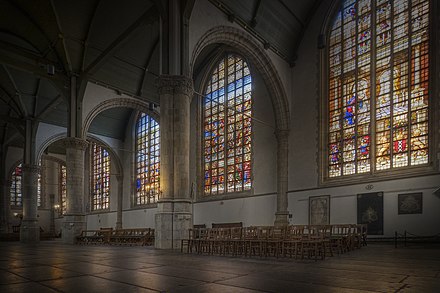

 Gouda is a typical and beautiful Dutch town. It's a great place to walk, checking out the old buildings and canals.
Gouda is a typical and beautiful Dutch town. It's a great place to walk, checking out the old buildings and canals.
- Stadhuis (Old Town hall), Markt 1 (Center of the Markt), 52.01167°, 4.71056°, +31 182-588482. M-F 10:00-12:00, 14:00-16:00; Sa 11:00-16:00 (15:00 Oct-Mar). The old town hall on the Markt square is the oldest Gothic town hall in The Netherlands. Built out of sand stone between 1448 and 1450, it is now a museum and wedding location and is open to visitors. €1.50
- The Cheese Market and De Waag (Cheese Weighing House), 52.012196°, 4.71082°. Every Thursday morning in from april to august, there is a traditional cheese market. The building where the cheese used to be weighed (De Waag) is a typical example of neoclassical Dutch architecture from the 17th century and now hosts a small cheese museum. De Waag is opened 1 Apr-31 Oct: Tu-Su 13:00-17:00, Th 10:00-17:00. Check out the cheese market, eat some cheese, see the old cheese weighing house, built by Pieter Post in 1668, now a museum to (you guessed it) cheese! Adult €3.50, child €3
- St. Janskerk (St. John’s Church), Achter de Kerk 16, 52.010833°, 4.711389°, +31 182-514119, info@sintjan.com. This church is famous for its beautiful stained glass windows and is a must see. It is the longest (not tallest) church in the Netherlands. The area around the church is the oldest and probably the most beautiful part of town.
- Museum Gouda (Gouda Museum), Achter de Kerk 14 (entrance next to the St. Janskerk. Pass through the small gate.), 52.01008°, 4.71124°, +31 182-331000, info@museumgouda.nl. W-F 10:00-17:00, Sa Su 12:00-17:00. Museum about the history of Gouda. There are displays of paintings, archaeology, old clay pipes and pottery. Information and guided tours are available in English. There is a massive scale model of the city in the 16th century. Over 18 €5, under 18:free
- Museumhaven Gouda (Gouda Harbor Museum), 52.006985°, 4.711297°. This museum tracks the history of Gouda harbour and shipbuilding. There are also some old ships and buildings to see. All information is in Dutch.
- Verzetsmuseum Zuid-Holland (The Resistance Museum), Turfmarkt 30, 52.012539°, 4.708914°. Museum about the Dutch resistance in World War II. Article info and guided tours available in English. Adult: €3, child: free, concession: €2
- The Vier Gekroonden, Naaierstraat 6, 52.011647°, 4.708964°. One of the oldest remaining brick houses in Gouda.
- Canals. There are various canals in the city centre. They are lined by historic houses. A visit to Gouda is not complete without taking a relaxing walk along the canals!.
- Gouwe, 52.009957°, 4.707093°. This canal is actually an old river, the one that gave Gouda its name. The canal is dominated by the 80-m tower of the Gouwekerk (Gouwe church)
- Haven, 52.008656°, 4.712307°. One side of the canal is called Oosthaven, the other is called Westhaven. The buildings along this canal were built by the patriarchy of the city in the 17th and 18th century.
- Turfmarkt, 52.011817°, 4.707595°. The quays of this canal are extremely low. It is lined by interesting historic buildings.
- Peperstraat, 52.008605°, 4.711261°. Charming little canal lined by old warehouses that were converted to houses.
- Windmills. There are four windmills (two of them in the city centre) remaining in Gouda.
- Molen 't Slot, Punt 17, 52.007388°, 4.714857°, +31 182 524655.
- Molen de Roode Leeuw, Vest 65, 52.007712°, 4.707679°, +31 182 522041. Possible to visit by appointment only. Old cemetery, Prins Hendrikstraat 3, 52.006612°, 4.706540°. In the 1970s, this graveyard was abandoned, but the graves are still there, covered in tall grass. It's a little bit eerie, but also a very beautiful place to visit. free
Do
- Canal Tour (Rederij de IJsel). There are not as many canal boats as in Amsterdam, but it's still possible to take a canal tour through Gouda. Tickets can be bought at the Tourist Office.
- Take a guided tour through the city centre (Goudse Gidsen Gilde), info@goudsegidsengilde.nl. The Gouda Guides Guild offers a wide variety of walking tours through the historic city center of Gouda. They can show you the highlights of the city, or will base the tour on a certain historical topic, it's up to you! €3.50 per person for a tour in a group, €75 for a private tour
- Cinema (Cinema Gouda), Burgemeester Jamessingel 52, 52.018289°, 4.706068°, +31 182-527773. 6-screen cinema next to train station. English movies shown with Dutch subtitles. €8-9
- Arthouse Cinema (Filmhuis Gouda), Lethmaetstraat 45, 52.007627°, 4.701931°, +31 182-527773. Small arthouse cinema. €6-8
- Theatre (Goudse Schouwburg), Boelekade 67, 52.015565°, 4.711995°, +31 182-513750. Large theatre (1045 seats) with a diverse line-up.
- Relax at Spa Gouda (Spa Gouda), Lange Groenendaal 79, 52.010627°, 4.707937°, +31 182-504201. An old public bathing house from the 1920s has been converted to a lush oriental spa, offering various massages, baths, saunas and beauty treatments.
- Swim (Groenhovenbad), Tobbepad 4, 52.023703°, 4.689330°. Large public swimming pool
- Play Golf, Sluisdijk 15, 2809 NA, 51.998380°, 4.689614°, +31 182 583933, info@golfbaan-ijsselweide.nl. Daily 08:00-sunset. Nine hole golf course, driving range, 18 hole putting green and restaurant. Equipment rental and lessons available. Weekends €30, weekday €20-25
- Visit a ceramics factory, Middelblok 134b, 2831BP, 51.9944293°, 4.6880585°, +31 182 373839, info@dutchceramics.com. M-F 08:00-17:30 (tours on Thursday). Factory of traditional Dutch ceramics, including Delftware. €12.50
- Galerie Montulet, Hoge Gouwe 115 (centre of Gouda), +31 182-338239. 12:00 - 17:00. Gallery exhibitions of modern jewellery made by Dutch jewelly-designers. The gallery is open from Thursday till Sunday from 12:00-17:00.
Festivals
- Cheese Market. Every Thursday between April and August, you can visit the traditional cheese market where farmers sell their cheese. It is located on the Markt square.
- Gouda Bij Kaarslicht. In the month of December, the city centre gets lit up in special ways. This also contains the Candlelight night on the second Tuesday of December.
- Goudse Concerten. During the summer season, there are open-air concerts at the Houtmansplantsoen (a park in the city center).
- Gouda Culinair. An annual event which revolves around food: Culinary Gouda. In September, Houtmansplantsoen in Gouda is transformed into the biggest and tastiest open-air restaurant for miles around.
- Oranjenacht. The night before Kingsday, a large open-air music event is hosted on the Markt square. This is usually on april 26th.
- {{do | name=Koningsdag | alt=King's Day | url=http://www.oranjenacht.nl/ (dead link: December 2020) | email= | address= | lat= | long= | directions= | phone= | tollfree= | hours= | price= | wikipedia=Koningsdag | content=April 27th is the national holiday of the Netherlands. This is also celebrated in Gouda, with different activities and events each year. }}
Buy
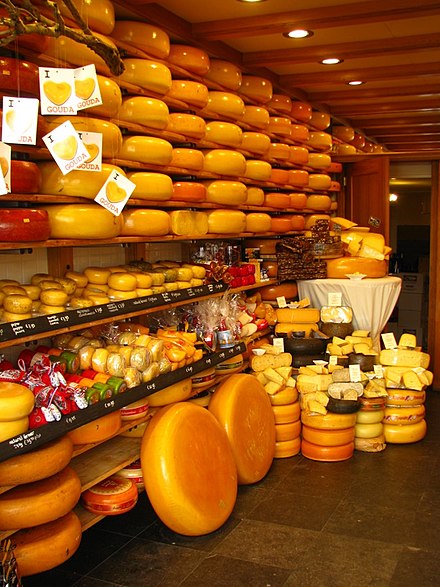
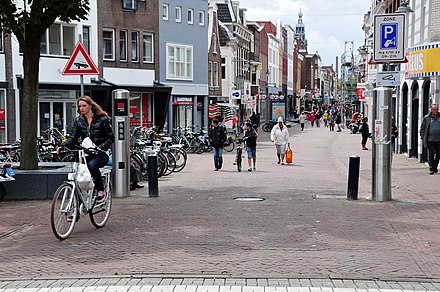 Most shops are open M-Sa 09:00-17:00, and until later on Thursday evenings. On Sundays, many stores are closed, except stores that sell fresh products. Most restaurants and bars are open on Sundays.
Most shops are open M-Sa 09:00-17:00, and until later on Thursday evenings. On Sundays, many stores are closed, except stores that sell fresh products. Most restaurants and bars are open on Sundays.
The busiest shopping street is Kleiweg. Here you can find the regular brands you can find in many Dutch cities, such as Hema, V&D, H&M, The Sting, Blokker, et cetera. In streets such as Tiendeweg, Zeugstraat and Lange Groenendaal, you can find small independent shops with more unique products.
- Gouda cheese, NA°, NA°. This world famous cheese gets its name from the town. It's been made locally with cow's milk since the middle ages. The cheese isn't made in the town itself, but the surrounding area. Real Gouda cheese is made on the farms, and is not pasteurized so it retains much more flavour. As a result of this, the cheese is not exported and can only be bought in the Netherlands. Check out the Cheese market or some of the amazing cheese shops in the town. There are several cheese shops in Gouda.
- 't Kaaswinkeltje, Lange Tiendeweg 30, 52.011319°, 4.712617°. Exclusively sells Gouda cheese.
- {{buy | name=Lekker Gouds | url=http://lekker-gouds.nl/ (dead link: December 2020) | email=info@lekker-gouds.nl | address=Hoogstraat 1 | lat=52.012292 | long=4.709893 | directions= | phone=+31 183 507418 | tollfree= | fax= | hours= | price= | content=Sells Gouda cheese, other cheeses, wine, sauces, etc. }}
- Koetschuysch Kaas, Korte Groenendaal 8, 52.011239°, 4.709589°.
- Farm Shop Gouda, Blauwstraat 3, 52.012632°, 4.709611°, +31 182 526735. Sells cheese, poultry and eggs.
- Cheese Museum, Markt 35 (Located in De Waag). Cheese museum and store.
- Goudse stroopwafels. These traditional Dutch cookies were invented in Gouda in the 19th century. Two thin wafers with a caramel filling. Yummy! You can buy tins and packs of waffles in various shops around town.
- Het Siroopwafel Winketje, Agnietenstraat, Kiosk 2 (On the outside of a hideous building with red tiles), 52.013563°, 4.710888°. For a warm, fresh waffle, try 'Het Stroopwafelwinkeltje', hidden next to the Hema entrance at the Agnietenstraat, just north of the Markt and the Waag.
- De Vlaam, Markt 69, 52.011429°, 4.709950°. The De Vlaam bakery bought the original stroopwafel recipe when the descendants of the inventor retired.
- Siroopwafelbakkerij Van Vliet, Lange Groenendaal 32, 52.011291°, 4.708931°.
- Maranto, Lange Groenendaal 59, 52.010872°, 4.708371°. Bakery specialized in stroopwafels
- {{buy | name=Goudse kaarsen | url=http://kaarserij-degoudakaars.nl/ (dead link: December 2020) | email= | address=Wijdstraat 6 | lat=52.010658 | long=4.710238 | directions= | phone= | tollfree= | fax= | hours= | price= | content=Traditional Dutch candles that light up the room. }}
Besides the usual shops in Gouda, you will also find many independent shops. Without the intention to be complete, some of them are listed below:
- Free Music High Fidelity, Turfmarkt 12, 52.012766°, 4.709391°, +31 182 514 834, freemusic-gouda@planet.nl. M-Sa. Independent record store, selling vinyl, cd's and hi-fi equipment.
- Boomboxx, Zeugstraat 52, 52.012197°, 4.712196°, +31 182 514 834. M-Sa, and the first Sunday of the month. Urban fashion, sneakers, apparel.
- Tafel van tien, Sint Anthoniestraat 13-15, 52.012969°, 4.710422°. Design and home decoration.
- Karakter, Lange Groenendaal 66, 52.010826°, 4.708095°. Fashion by small brands and labels, for both men and women.
- Play Today Lego Shop, Lange Tiendeweg 31, 52.011636°, 4.713122°. Biggest LEGO store in the Netherlands.
Eat
There are lots of small cafes and bars at the north side of the Markt.
- De Koffiefabriek, Nieuwe Markt 64, 52.013422°, 4.711795°, +31 182-551 969, lekkerbakkie@koffiefabriekgouda.nl. Su-M 10:30-19:00, Tu-Sa 08:00-19:00, Th 08:00-22:00. In the northern part of the city centre, this charming coffee bar offers a range of coffees and teas, as well as pastries, sandwiches and soups.
Asian cuisine
- New Tandoor, Lange Tiendeweg 49, 52.011819°, 4.713542°, +31 182 529733. Tu-Su 17:00-22:30. Indian restaurant, cheap prices, good food. Mains €12-15
- Sajaki, Nieuwehaven 232, 52.01281°, 4.70635°, +31 182 513161. Tuesday-Sunday, 16:00-20:00 (or 20:30 in summer). Mondays closed. In the western part of the city center, this small restaurant is considered the best place in Gouda to try traditional "Indische" (Dutch-Indonesian) cuisine. Take-away is also possible.
- Kichi, Sint Anthoniestraat 14, 52.013068°, 4.710348°, +31 182 860045. Tuesday 16:00-22:00, Wednesday-Saturday 12:00-22:00, Sunday 16:00-21:00. Closed on Mondays. Japanese restaurant with good reviews.
- WokAmor, Achter de Waag 5, 52.012579°, 4.710766°, +31 182 860045. Daily 12:00-21:00. Asian take-away restaurant. It's also possible to eat inside.
- Bangkok City, Lange Tiendeweg 57, 52.011955°, 4.713831°, +31 182 551333. Thai cuisine ~€27.50 for a three-course dinner
Dutch/European cuisine
- Brunel, Hoge Gouwe 23, 52.009682°, 4.709365°, +31 182 518979. Modern French restaurant on a beautiful street. Mains €21.50
- Grand Cafe Central, Markt 22-23 (On main square), 52.011816°, 4.711546°, +31 182-512576, info@grandcafecentral.nl. M 18:00-00:00, Tu-Su 09:00-00:00. A traditional grand cafe in an old Dutch building with art deco interior at the Markt square. Open throughout the day, with good food and drinks, friendly staff and plenty of space. Renowned for its apple pie.
- De Zalm (means "the Salmon"), Markt 34, 52.012218°, 4.711118°, +31 182-686976, info@dezalm.com. A somewhat upmarket restaurant/bar at the Markt.
- Eetcafe Vidocq, Koster Gijzensteeg 8 (Down a little lane, just off the Markt.), 52.011222°, 4.711366°, +31 182-522819, vidocq@eetcafevidocq.nl. A great cozy Dutch feeling restaurant with great food (especially steaks). The menu is written on a blackboard on the wall. Very popular.
- Heinde & Ver, Wijdstraat 13, 52.0106°, 4.7100°, +31 182-551221, info@heinde-ver.nl. Tu-Su 17:00-23:00. Restaurant that combines local/regional food (cheese, steak, etc) with international cuisine.
- Koeien en Kaas, Achter de Waag 20, 52.012460°, 4.711099°, +31 182-686689, eten@koeienenkaas.nl. Daily 17:00-22:00. Local cuisine, with steaks and cheese as a specialty.
- {{eat | name=Scheeps | url=http://www.restaurantscheeps.nl (dead link: December 2020) | email=restaurantscheeps@planet.nl | address=Westhaven 4 | lat=52.010048 | long=4.710350 | directions= | phone=+31 182-517 572 | tollfree= | fax= | hours= | price= | content=Beautiful, more upmarket restaurant, with lots of pictures of ships on the walls. }}
- De Mallemolen, Oosthaven 72, 52.007315°, 4.713794°, +31 182 515 430. French cuisine. €27.50 for a three course dinner
- Buiten, Oosthaven 23a, 52.009329°, 4.712064°, +31 182 524 884. €29.50 for a three-course dinner
- In de Salon, Karnemelksloot 1, +31 182 - 51 21 15. Daily 11:30-14:00, 16:30-19:30. "In de Salon" is the oldest and one of the best pancake restaurants in Holland, the decor hasn't been changed in 150 years which gives it a very homely old fashioned feel, their pancake's however are made from the freshest ingredients and the poffertjes are baked on their 150 year old wood fired stove, a can't miss when going to Gouda €10-20
Italian
- Roma, Lange Tiendeweg 88, 52.011993°, 4.714195°, +31 182-528781. Italian restaurant
- Pizzeria Peppone, Wijdstraat 26, 52.010982°, 4.710350°, +31 182-522408. Italian restaurant, with outdoor terrace
- l'Angolo Divino, Wijdstraat 9-11, 52.010513°, 4.710066°, +31 182-524466. Open Tuesday to Sunday. Italian restaurant About €30 for a dinner
- La Piazza, Markt 29, 52.012040°, 4.711354°, +31 182-522993. Italian restaurant, with outdoor terrace
Tapas
- La Cubanita, Jeruzalemstraat 2, 52.011267°, 4.712924°, +31 182 670714. Open 7 days a week. Tapas bar
Mexican
- Xochimilco, Wijdstraat 29 (South of Market), 52.010837°, 4.710017°, +31 182 523120. Tu-Su 17:00-23:00. Mexican restaurant running for 18 years in Gouda. €14-20
Fast food
- Bram Ladage, Wijdstraat 24, 52.010946°, 4.710307°, +31 0182 523198. Open 7 days a week. Real Dutch "patat" (fries)
Drink
Clubs
- So What!, Vest 30, 52.008015°, 4.706660°, +31 182 519232. F 22:00 - late, Sa 22:30 - late. A nice and friendly place with a stage and a bar in the centre of Gouda. Perfect to get a drink and go dancing during the weekends. National bands are playing regularly. €1.90 for a beer
- StudioGonz, Turfsingel 36, 52.008393°, 4.704796°, +31 182 526499, info@studiogonz.nl. Thursdays, Fridays, Saturdays and Sunday, depending on the program. Underground stage and alternative club.
Bars
- De Zalm, Markt 34, 52.012218°, 4.711118°, +31 182-686976, info@dezalm.com. De Zalm is probably the most well known bar/bistro in Gouda.
- {{drink | name=Tof | url=http://tofingouda.nl (dead link: December 2020) | email=info@tofingouda.nl | address=Markt 30 | lat=52.012093 | long=4.711280 | directions= | phone=+31 182-548897 | tollfree= | fax= | hours=Su-W 10A:0₩-01:00, Th-Sa 10:00-04:00 | price= | content=Modern bar on the Markt. Popular with the younger crowd, especially on weekends. }}
- {{drink | name=Woodies | url=http://www.cafe-woodies.nl (dead link: August 2020) | email=info@studiogonz.nl | address=Zeugstraat 5 | lat=52.011713 | long=4.712407 | directions= | phone=+31 182 518499 | tollfree= | fax= | hours= | price= | content=Busy bar, many young people, music and dancing. }}
- Swing, Markt 24, 52.011861°, 4.711502°, +31 182 524807. Live music at thursday, friday and saturday. Free entrance. Minimum age 21.
- La Cubanita, Jeruzalemstraat 2, +31 182 670714. Open 7 days a week. Pub focusing on Spanish drinks and tapas.
Sleep
Gouda is a very popular day trip destination. Accommodation options used to be limited, but this has been changing.
- Best Western City Hotel Gouda, Hoge Gouwe 201 (Western corner of the city centre, in the 'Bolwerk' area.), 52.011377°, 4.704064°, +31 182-860086, info@bestwesterngouda.nl. Modern hotel with 101 rooms, part of the Best Western chain in the historic centre.
- Campanile Hotel Gouda, Kampenringweg 39-41 (2 km from city centre, at the A12 motorway), 52.027500°, 4.679267°, +31 182-535555, gouda@campanile.com. 75 rooms with satellite TV and Wifi. Restaurant with buffet breakfast, lunch and dinner. Double/twin €80+
- Hotel De Keizerskroon, Keizerstraat 11-13, 52.008995°, 4.708603°, +31 182-528096, info@hotelkeizerskroon.nl. Budget hotel, right in the centre of town. Ensuite: Double €79.50, triple €95. Shared bathroom: Single €50, double €60, triple €69.50
- Hotel De Utrechtsche Dom, Geuzenstraat 6 (In the centre), 52.01185°, 4.71435°, +31 182 528833, info@hotelgouda.nl. Characteristic family hotel in the centre of Gouda. Breakfast included. Ensuite: Suite €125, double €85. Shared bathroom: Double €65
Nearby
- Hotel Over de Brug, Ad en Vic Versteeg, Veerlaan 1, 2851 BV, Haastrecht (Take Provincialeweg West (N288) from Gouda), +31 182 501210, +31 182 501415. This traditional hotel on the River IJssel, is about 5km from Gouda, in the small town of Haastrecht. It's an easy cycle to Gouda. There is a pub/restaurant. Free Wi-fi and parking. Double €67, single €40
- Tulip Inn, Goudseweg 32, 2411HL, Bodegraven (6 km outside Gouda, just off the A12; take bus 178 from Gouda), 52.067285°, 4.739119°, +31 172-650003, info@tulipinnbodegraven.nl. 64 rooms all with balcony. There are two restaurants and a bar. €65.50-95.50, Breakfast €12.50
Stay safe
Gouda is, in general, a safe city, even at night time. There used to be a lot of car crime, but CCTV cameras have reduced this to normal levels. Just don't leave your valuables in the car.
- Police Station, Nieuwe Gouwe Oostzijde 2. M-F 08:00-21:00; Sa Su 09:00-17:00.
- Hospital (Groene Hart Ziekenhuis), Bleulandweg 10, +31 1820 566 666.
Go next
Due to its central location, Gouda makes for a good base to explore the region and easily connects to other sights in the Netherlands.
- Oudewater - this village is 15 km from Gouda, and the route in between makes for a scenic bike ride. Oudewater is famous for its witch weighing house, where they issue certificates proving people aren't witches. It became famous during the 16th century because people accused of witchcraft were offered an honest chance of proving their innocence. In many cities and countries such trials were usually rigged, resulting in the burning or drowning of hundreds of innocent people. No witches ever were found in Oudewater...
- Rotterdam - the second largest city in the Netherlands, and the second largest port in the world is only 15 min from Gouda. Check out its 20th-century architecture and great shopping.
- The Hague - home of the Dutch government and the residence of the Dutch Queen, this city is full of history at less than half an hour from Gouda.
- Utrecht - the city has some great historic architecture and is a transport hub for the Netherlands.
- Delft - a historic city known for its Delftware pottery, Delft is about 40 min away (by train or car) from Gouda.
- Leiden - with the second-largest city centre (after Amsterdam) and a lively student population, Leiden is an interesting city to visit.
Cycle route in the Gouda area (in English):
South Holland
Primary administrative division
